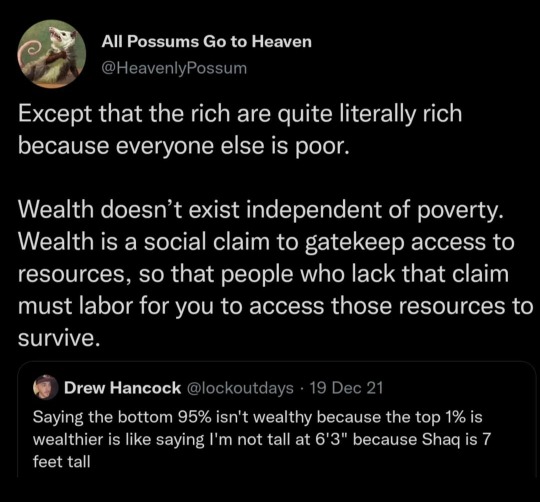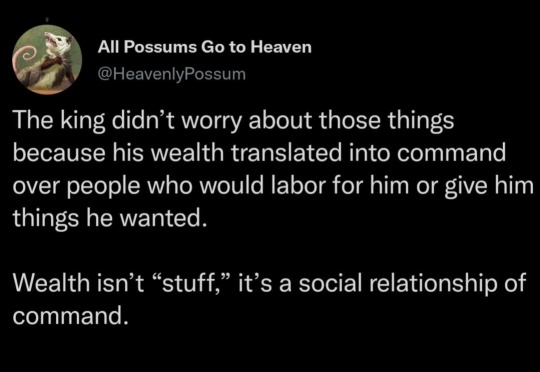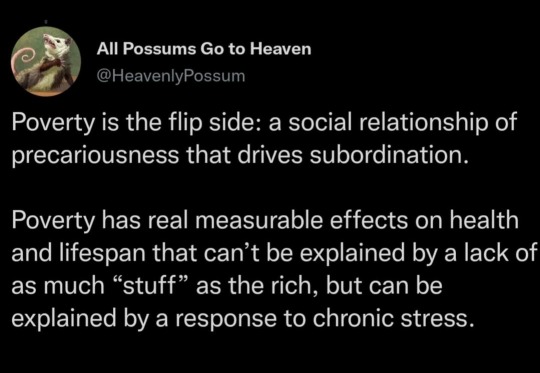Academicosas. Le juro que no es plagio, profe. Un texto más del pelao esclavista y quemo todo. (Este Semestre = Marx & Bakunin son mis pastores, nada me faltará.)
Don't wanna be here? Send us removal request.
Text
"Religion is the general theory of this world, its encyclopaedic compendium, its logic in popular form, its spiritual point d’honneur, its enthusiasm, its moral sanction, its solemn complement, and its universal basis of consolation and justification. It is the fantastic realization of the human essence since the human essence has not acquired any true reality. The struggle against religion is, therefore, indirectly the struggle against that world whose spiritual aroma is religion.
Religious suffering is, at one and the same time, the expression of real suffering and a protest against real suffering. Religion is the sigh of the oppressed creature, the heart of a heartless world, and the soul of soulless conditions. It is the opium of the people.
The abolition of religion as the illusory happiness of the people is the demand for their real happiness. To call on them to give up their illusions about their condition is to call on them to give up a condition that requires illusions. The criticism of religion is, therefore, in embryo, the criticism of that vale of tears of which religion is the halo."
–Karl Marx, "Introduction to A Contribution to the Critique of Hegel’s Philosophy of Right" (1843)
—
"Social revolutionaries, of course, do not [religion], and they take every opportunity to speak the murderous truth, in the presence of the people, to the Lord of Hosts and his theological, metaphysical, political, legal, police, and bourgeois-economist representatives on earth. But they do not place the religious issue in the forefront, for they believe that the people’s superstition, while a natural accompaniment of their ignorance, is rooted not so much in their ignorance as in their poverty, in their material sufferings and the unheard-of oppressions of every sort which they endure each day. Their religious conceptions and fables, their fantastic predilection for the absurd, are phenomena more practical than theoretical, and not so much a mental delusion as a protest of life, will, and passion against the unbearable burden of their existence. For the people, the church is a kind of celestial tavern, just as the tavern is a sort of celestial church on earth. In church and tavern alike they forget, at least momentarily, their hunger, their oppression, and their humiliation, and they try to dull the memory of their daily afflictions, in the one with mindless faith and in the other with wine. One form of intoxication is as good as the other.
Social revolutionaries know these things and therefore are convinced that the people’s religiosity can be eliminated only by a social revolution, and not by the abstract, doctrinaire propaganda of the so-called free-thinkers. Those gentlemen are bourgeois from head to toe, incorrigible metaphysicians in their methods, habits, and way of life, even when they call themselves positivists and fancy themselves materialists. It always seems to them that life follows from thought, that it is in some way the realization of a preconceived idea, and hence they believe that thought (their impoverished thought, of course) should direct life. They do not understand that thought, to the contrary, follows from life, and that in order to alter thought one must first of all change life. Give the people a broad human existence, and they will amaze you with the profound rationality of their ideas.
The inveterate doctrinaires who call themselves free-thinkers have yet another reason for making theoretical, anti-religious propaganda a prerequisite for practical activity. For the most part they are bad revolutionaries, simply vainglorious egotists and cowards. "
–Mikhail Bakunin, "Statism and Anarchy" (1873)
95 notes
·
View notes
Text
does anyone have that quote that goes something like 'white germans under the nazis lived just fine as long as they were loyal to the state, gave their children to the army, and paid their taxes, and in this sense many americans would be comfortable living under fascism' trying to find who said it but google is giving me jack shit
53K notes
·
View notes
Text




Michael Parenti, "Fascism in a Pinstriped Suit," essay published in Dirty Truths: Reflections on Politics, Media, Ideology, Conspiracy, Ethnic Life and Class Power (1996)
3K notes
·
View notes
Text
academic papers about black sails
Jones, Clint, "Black Sails as Philosophy: Pirates and Political Discourse"
Myrvang, Olav Kjetil, "Because I don’t want to be a pirate" - A Contextual Study of the Representation of Long John Silver in Treasure Island and Black Sails
Carcas, Leyres, “HETEROBAITING”: BLACK SAILS AND THE SUBVERSION OF QUEERBAITING TROPES
Schneider, Elisabeth, "RECLAIMING QUEERBAITING: A CALL TO ACTION"
Friedrich, Kathrin, "‘Evil Heroes’ in Black Sails – A Case Study: How Character Complexity and Nonverbal Actions Invite Positive Viewer Responses"
Razman, D. C. (2020) “Black Sails, Rainbow Flag: Examining Queer Representations in Film and Television” [click for pdf]
Srividhya Swaminathan, (2017) “The New Cinematic Piracy: Crossbones and Black Sails” (in ‘The Cinematic Eighteen Century: History, Culture, and Adaptation’ (2017, 1st ed.) edited by Srividhya Swaminathan and Steven W. Thomas)
Dirksen, S.J. (2019) “Constructing the Identity of the Popular Pirate: The Outlaw, Marginal Identities, and Utopia in Black Sails (2014-2017) and Assassin’s Creed IV: Black Flag (2013)”
Min-Chi Chen (2024) “Weaponizing Monstrosity: Starz’s Black Sails and the Power of Monstrous Narrative” (in Chapter 2 of ‘Monsters and Monstrosity in Media: Reflections on Vulnerability’, 23, 2024, edited by Yeojin Kim, Shane Carreon)
Jessica Walker “Civilization’s Monsters: The Doomed Queer Anti-Imperialism of Black Sails” (in ‘Pirates in History and Popular Culture’ (2018) edited by Antonio Sanna) [entire book in pdf]
“From Dogs to Kings” https://www.diva-portal.org/smash/get/diva2:1332062/FULLTEXT01.pdf
2K notes
·
View notes
Text
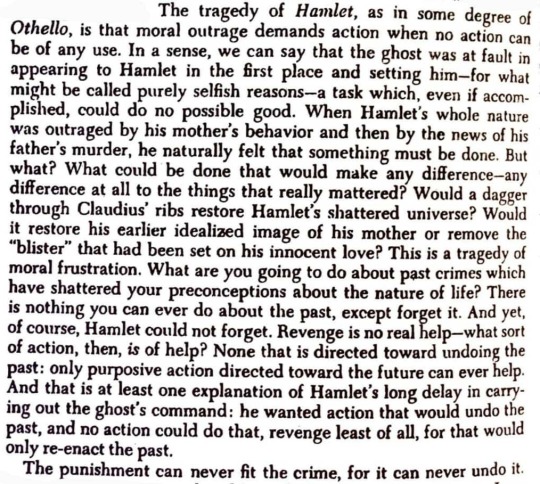
Absolutely insane lines to just drop in the middle of an academic text btw. Feeling so normal about this.
[ A Critical History of English Literature, Vol. 1, Prof. David Daiches, first published in 1960 ]
#OH GOD FINALLY#Loving this I'm using it on my next exam#subject: literature#It's been so long since I've reblogges something for literature here#You know#MY ACTUAL DEGREE#TwT#Hamlet#Shakespeare
41K notes
·
View notes
Text
I talk frequently about how ignorant most Global North citizens are about the immigration policies of their own and other countries. When my husband and I (Global North citizens of different countries) got married, we had conversation after conversation with people who assumed that by producing our marriage certificate we could simply become residents of each other’s countries— and that we could not be refused residence in each other’s countries, as separating a husband and wife could surely not be allowed.
More interestingly, a lot of people seem to refuse knowledge about immigration, perhaps because it can’t be integrated into some deep and important picture of the world that they have. My parents can’t make themselves believe that my British husband would get in trouble if he overstayed his visa “just a couple of days” in the US, or that I (an American) would ever get deported from the UK, no matter what the circumstances. This is not only because they believe that British and American citizens, as Global North citizens, are specially exempt from the systems that are “meant” to regulate other kinds of people, but also because fundamentally they believe that government and its processes are rational and just. They must believe that government and its processes are rational and just, because otherwise their whole picture of the world— the means by which they understand it— would collapse.
This is all fairly simple and obvious. What is not so simple and obvious is the way that their privileged ignorance, the hothouse resilience of their fantasy world, is part of a mechanism through which the “work of knowing” in our society is outsourced to the underprivileged. (The privileged do not have to know in a way that disrupts their fantasy, because not-knowing has no consequences for them.) This is an interesting dynamic, because many postcolonial theorists (Sara Ahmed, Dipesh Chakrabarty, etc) have explored how the Global South is typically portrayed as that-which-is-known-by-the-Global-North, and therefore as not capable of knowing. So what does it mean that the tools of regulation remain in the hands of the Global North, but that the knowledge of regulation is a burden borne by the Global South? There is an element here of knowing as knowing-your-place, for sure— learning to be interpellated as the illegal and the undesirable. The knowing that is happening also constitutes the production of the illusive “just and rational” world that sustains the Global North. I’m interested in the way that the dehumanization of the Global South therefore serves to sustain the rational and just Human and humaneness of the Global North. There’s an abjectification that is necessary for this— as anyone who has experienced universal healthcare knows, more just and equitable care/distribution of resources often means that more privileged people get less-nice things than they have been led to expect, so if they want to continue to enjoy the same standard of living allowed them by unjust and non-equitable care, they must rationalize this somehow. And how does one rationalize having been, by chance, born in the right geographic area? One can’t. One must, instead, believe that this is not how privilege is allotted, which required not-knowing that this is how privilege is allotted.
8K notes
·
View notes
Text

10K notes
·
View notes
Text




Michael Parenti, "Fascism in a Pinstriped Suit," essay published in Dirty Truths: Reflections on Politics, Media, Ideology, Conspiracy, Ethnic Life and Class Power (1996)
3K notes
·
View notes
Text

Bro absolutely COOKED with this.
61K notes
·
View notes
Text
I don't know how people came to think that "the banality of evil" means "evil people are people too".
That's also true but it's not what the banality of evil means.
The term was coined by Hannah Arendt in her report on the trial of Adolf Eichmann, the architect of the "final solution" in the Holocaust.
It describes the way in which the Nazis at large and Eichmann in particular have turned the horrendous act of mass murder into just another job, disconnecting themselves morally and emotionally from their actions.
Before the death camps and gas chambers, Nazi soldiers simply shot Jews into mass graves by the hundreds of thousands. It was a lot cheaper and faster, but it caused great psychological distress for the murderers who pulled the trigger.
The leadership's solution was a massively upscaled version of the "gas vans" they used to mass murder hundreds of thousands of Germans with disabilities and mental health issues.
Shooting bound civilians in point blank range over and over is something you can't just pretend you're not doing or is no big deal. But if you're just the guy who sorts people into groups. Or just the guy that funnels them into a room. Or just the guy who opens a cannister on the roof. It's much easier to distance yourself from what you know is happening.
The same principle applies to much lesser evils, like soldiers operating drones from a distance, or insurance workers denying coverage for life-saving treatment.
10K notes
·
View notes
Text
…psychiatry assumes that society does not cause distress in biologically normal people, who are considered biologically normal at least in part because they are economically productive. This assumption permits the conclusion that if a person is distressed to the point of unproductivity, it is because that person—not society—is abnormal. Thus, psychiatry’s commitment to biological essentialism not only masks the role of the constructed sociopolitical environment in creating distress but depoliticizes it by characterizing that allegedly irrational distress as induced by biological abnormality.
– Kiera Lyons, “The Neurodiversity Paradigm and Abolition of Psychiatric Incarceration” (2023)
18K notes
·
View notes
Text
Now that I've looked on it, there seem to be... perhaps not plenty, but very many examples in medieval literature of demons who are noble, helpful, and seek redemption.



(from "Fairies, Demons, and Nature Spirits: ’Small Gods’ at the Margins of Christendom")
And let's not forget Origen and his doctrine of Universal Reconcilation (even the Hells would be saved by God's infinite mercy) for which he was branded an heretic.
Just fuel for writing, or thought if you are a believer.
129 notes
·
View notes
Note
If marxism-leninism doesn't have any moral values attached, why does every marxist-leninist I see seem to be rooting for communism? Where are the MLs who treat the revolution as an inevitable but lamentable doomsday?
marxism-leninism isn't About moralism or morality, and it doesn't Need it. that said, morality isn't Wrong To Do Or Have. it's just not analytically relevant.
and we're rooting for communism because it rocks, and revolution is awesome, and it's not an inevitable but lamentable doomsday, it's awesome rad sicknasty epic swag, and it is the herald of an age where human beings are respected instead of ground into a fine paste to be sold as food.
694 notes
·
View notes
Text
"The best thing we can do with power is give it away" - On the leftist critique of superhero narratives as authoritarian power fantasies:
The ongoing "Jason Todd is a cop" debate has reminded me of a brilliant brief image essay by Joey deVilla. [EDIT: I SCREWED UP! This was created in 2019 by the guy who runs the Midnighter-Core page on Facebook, and Joey just reposted it!]
So here it is, images first and the full essay text below:
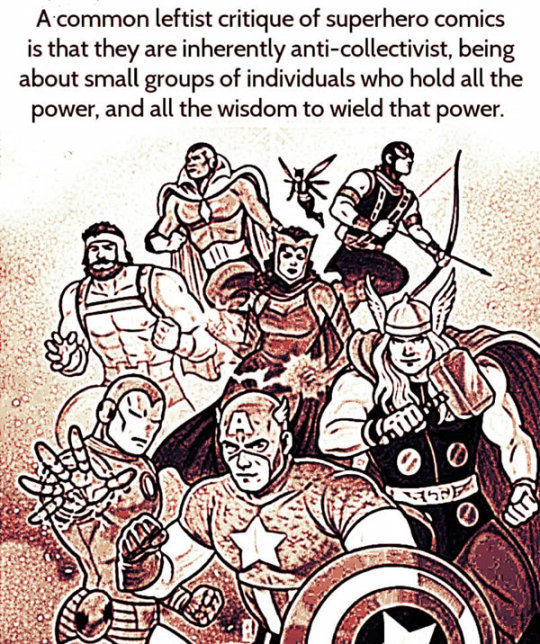
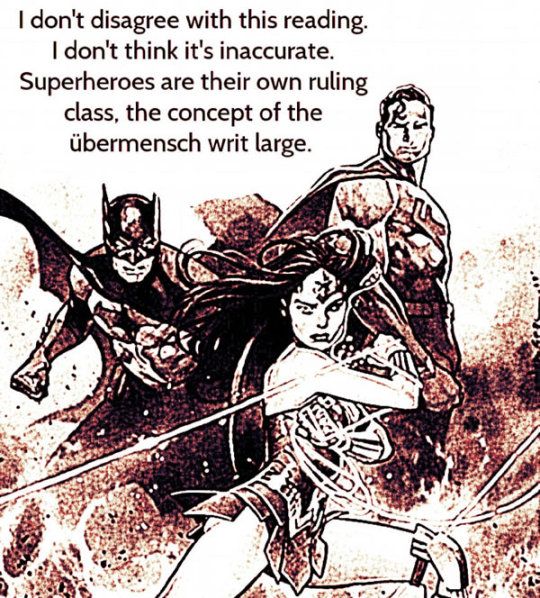
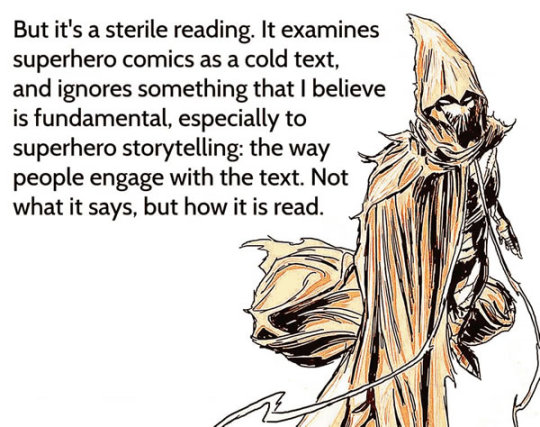


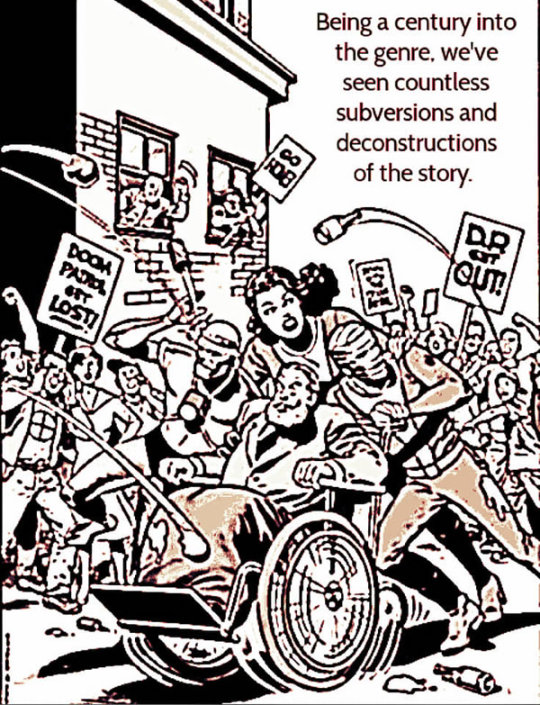
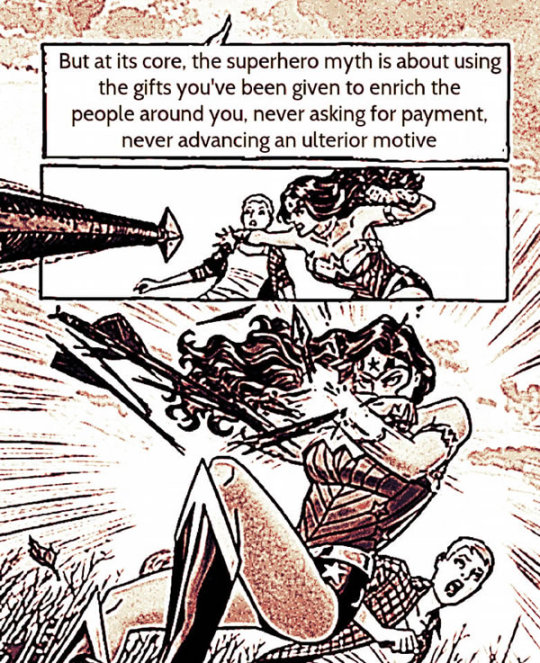
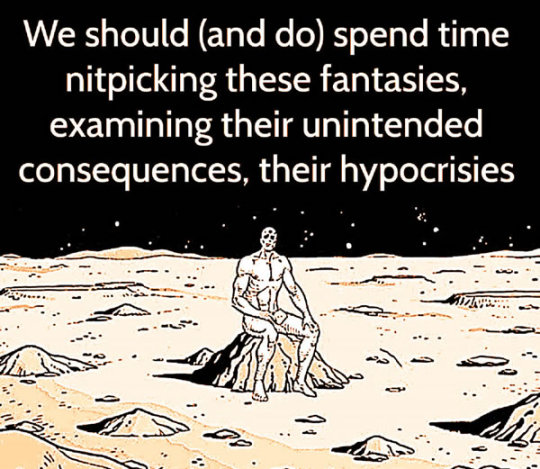
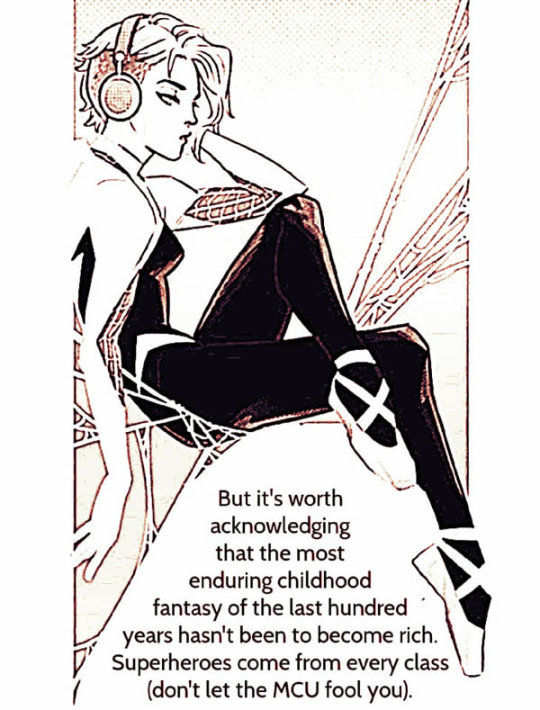
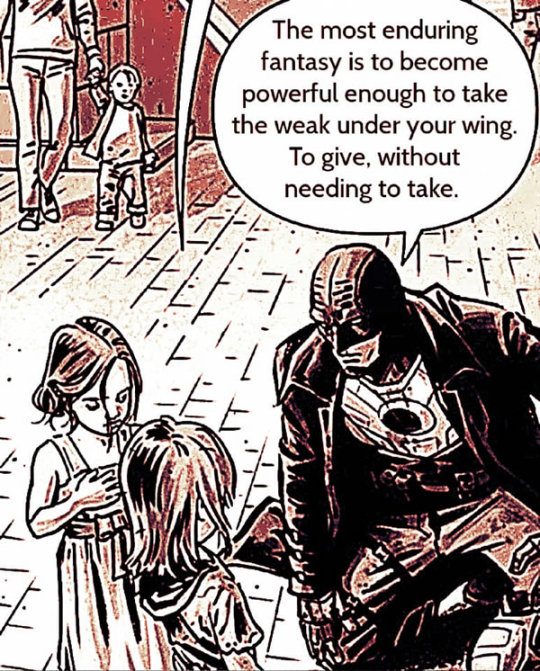
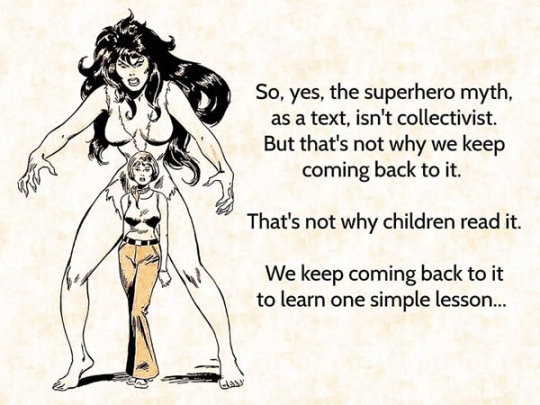

"A common leftist critique of superhero comics is that they are inherently anti-collectivist, being about small groups of individuals who hold all the power, and the wisdom to wield that power. I don’t disagree with this reading. I don’t think it’s inaccurate. Superheroes are their own ruling class, the concept of the übermensch writ large. But it’s a sterile reading. It examines superhero comics as a cold text, and ignores something that I believe is fundamental, especially to superhero storytelling: the way people engage with text. Not what it says, but how it is read. The average comic reader doesn’t fantasize about being a civilian in a world of superheroes, they fantasize about being a superhero. One could charitably chalk this up to a lust for power, except for one fact… The fantasy is almost always the act of helping people. Helping the vulnerable, with no reward promised in return. Being a century into the genre, we’ve seen countless subversions and deconstructions of the story. But at its core, the superhero myth is about using the gifts you’ve been given to enrich the people around you, never asking for payment, never advancing an ulterior motive. We should (and do) spend time nitpicking these fantasies, examining their unintended consequences, their hypocrisies. But it’s worth acknowledging that the most eduring childhood fantasy of the last hundred years hasn’t been to become rich. Superheroes come from every class (don’t let the MCU fool you). The most enduring fantasy is to become powerful enough to take the weak under your own wing. To give, without needing to take. So yes, the superhero myth, as a text, isn’t collectivist. But that’s not why we keep coming back to it. That’s not why children read it. We keep coming back to it to learn one simple lesson… The best thing we can do with power IS GIVE IT AWAY." - Joey deVilla, 2021 https://www.joeydevilla.com/2021/07/04/happy-independence-day-superhero-style/
- Midnighter-Core, 2019
https://m.facebook.com/story.php?story_fbid=pfbid0bU6TrKdX6QgMLnUFk64jResHMVwiSyENASvJk7efasgZ94G4c81XJCVgGcLFPgPsl&id=594855544368212&mibextid=Nif5oz
57K notes
·
View notes
Text
La desigualdad económica anula los beneficios del crecimiento para los pobres
Estuve revisando un estudio del profesor Nicholas Ngepah, de la Universidad de Johannesburgo, quien ha tomado el temazo de la desigualdad económica y lo ha puesto bajo el microscopio (no lo digo en sentido literal, se entiende). ¿La conclusión? La desigualdad es una especie de monstruo que se traga los beneficios del crecimiento económico, especialmente para la gente que vive en la pobreza. Así que, si pensaban que un aumento en el PIB era motivo de celebración, mejor piénselo dos veces, pues ese monstruo puede estar saboreando cada bocado del PIB en detrimento de los más pobres.

Para llegar a esta "reveladora" conclusión, Ngepah utilizó datos de encuestas a hogares y analizó la situación específica de diferentes distritos, un enfoque mucho más preciso que sólo mirar números globales. Esto significa que se enfocó en cómo la desigualdad y el crecimiento económico afectan en la práctica a las personas comunes, en lugar de quedarse en la esfera abstracta de las estadísticas. En otras palabras, mientras los números suben en los informes económicos, las familias pueden estar luchando a diario por sobrevivir.
El estudio muestra que la desigualdad no sólo incrementa la probabilidad de estar en situación de pobreza, sino que también amplía la brecha entre los que tienen y los que no.
Lo que hace que este estudio sea especialmente interesante es su contexto: analizó los efectos de la desigualdad durante periodos de crecimiento económico, pero también durante momentos de crisis, como la pandemia de COVID-19. Resulta que, ante un golpe económico, las familias más pobres son las que más sufren, y no porque les falte consuelo emocional —aunque eso no ayuda tampoco—, sino porque la desigualdad intensifica su situación precaria. Así que, mientras algunos celebran que el PIB está en verde, otros están intentando salir del rojo con una mano atada a la espalda, gracias a ese monstruo llamado desigualdad.
El estudio de Ngepah subraya algo que muchos de nosotros ya sabemos sin tanto método, y es que el crecimiento económico sólo es realmente beneficioso si se acompaña de esfuerzos para disminuir la desigualdad. Así que, si bien todos queremos un poco de crecimiento de la economía, no dejemos que la desigualdad nos prive de los beneficios que se supone trae consigo.
Les comparto el paper, que está en acceso abierto:
Ngepah, N. (2024). Asymmetric response of poverty to growth and inequality in South Africa: Implications for current and future shocks. Journal of African Economies, 33(Supplement_1), i30–i53. https://doi.org/10.1093/jae/ejae020
2 notes
·
View notes
Text
Putting all tabletop players into a college level ethics class and forcing them to turn in a paper on moral philosophy before buying a new book
36K notes
·
View notes
